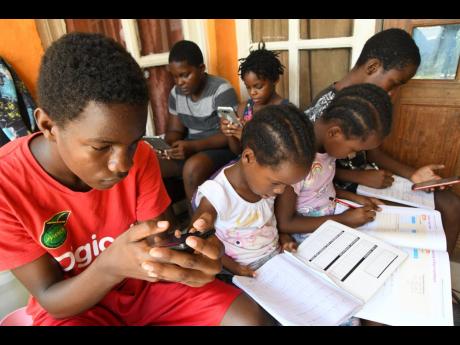Students juggle phones in online home classes
The resumption of the school term is often marked by students jostling for desks and chairs. Now, they’re scrambling for cell phones in an emerging scenario of musical chairs – especially in multichild households.
Several parents and teachers who say they were hoping for improved Internet capacity for students to access online classes during the post-Easter COVID-19 period disclosed that were left disappointed yesterday.
The complaint was that they “had no Internet”, or that “connectivity was spotty” in some areas, or that “households with more than one child are distinctly at a disadvantage” because of a lack of multiple devices.
Staceyanna Cunningham, a resident of Maverley, St Andrew, who lives with her child and who has guardianship of her sister, said that the only handicap she encountered in online classes was juggling a single smartphone between two children.
“My child’s teacher sends me, via WhatsApp, the day’s lesson, but at the same time, my sister also depends on the use of the phone for her classes, so what I find is that the poor phone now has space issues.
“The tablets the minister spoke about would be good right now because I also use the phone to conduct my business, and it is a real strain at the moment. What I have been doing is use the phone in the mornings until about mid-afternoon when they can get it to use,” said Cunningham.
The Gleaner was unable to get from the Ministry of Education an assessment of the scope and take-up for the resumed online sessions. Schools were ordered closed on March 13.
It was much the same complaint from Maverley Basic School principal Jacqueline Johnson, who uses social-media platform WhatsApp to educate her students.
“It is something the authorities will need to address if they are to expect the children to learn as much as when school was open physically,” Johnson said.
There are more than 500,000 registered students in Jamaica at the early childhood, primary, and secondary levels.
Jamaica Teachers’ Association (JTA) President Owen Speid said that connectivity woes will continue to mar online classes during the COVID-19-induced lockdown of schools if systemic inadequacies are not addressed.
“I know we having issues with Internet signals, mostly in rural areas, but also some urban communities. In fact, the signals are non-existent in some areas and intermittent in others, leaving the children to leaving home to search for spots where the signal is stronger,” Speid told The Gleaner.
“But with the stay-at-home command from the Government, it is going to make life a lot more challenging for them. They cannot leave to go find any spot anywhere,” Speid said.
He also reiterated funding concerns for teachers and parents in purchasing data.
WHATSAPP OPTION
Meanwhile, Kimoya Moss, a teacher at Maverley Primary School, said she has opted to ignore the online platforms the ministry has introduced, preferring to use WhatsApp almost exclusively to reach her students.
“I create my own and send videos and WhatsApp voice notes directly to my group and to the parents through email and the WhatsApp service,” she said, citing the 10-recipient limit as the main hurdle.
Meanwhile, a senior teacher at a high school in Montego Bay, St James, who wished not to be named, said that she has observed a lack of interest by some students, including a failure to complete assignments.
She said the onus is on parents to make sure students not only participate, but complete their work.
“The reality is that a number of our students, based on their economic background, are unable to be online as frequently as would be ideal,” the teacher said.
“When I send the work today, for example, and it’s graded work and it is expected to be in by Wednesday, some students might just be accessing it by Friday, and so on,” the teacher said, citing Wi-Fi access as well..
Gordon Swaby, CEO of EduFocal, an online learning platform that has partnered with the Ministry of Education to deliver content, said that there have been more than 50 classes on that medium so far this week.
This month alone, he said, 21,000 students logged on to EduFocal for live classes. Overall, 30,000 students used the platform.
Swaby said that even with the impressive numbers, he was concerned about children who have limited or no Wi-Fi accessibility at home.

